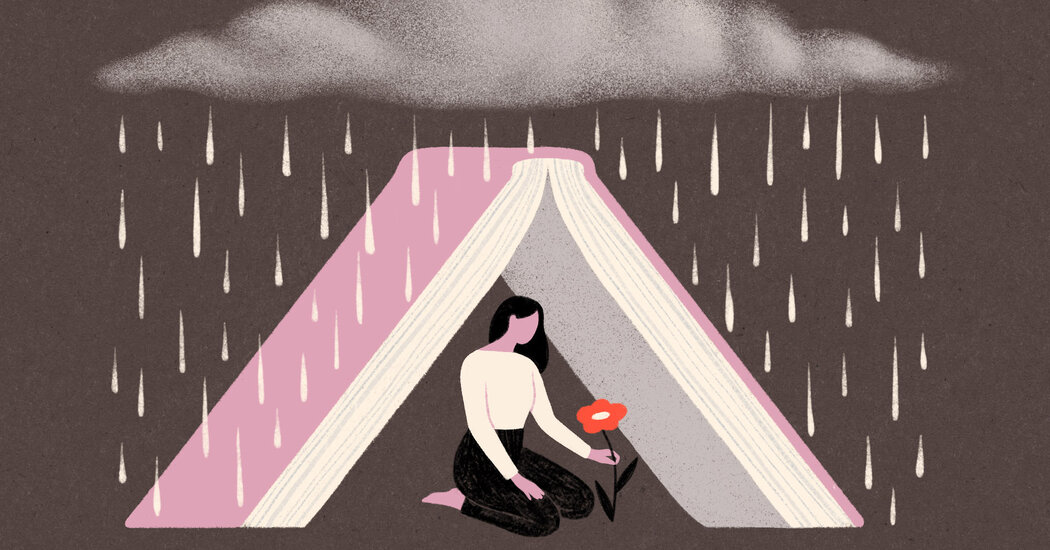Joanna Luttrell is well acquainted with grief. The bereavement coordinator supports families that are navigating a child’s terminal illness at St. Jude’s Children’s Hospital in Memphis.
From the moment they receive a diagnosis until a year after the loss, “I send letters, resources, emails,” Ms. Luttrell said, so that families know they have support. A big part of the process, she added, involves sharing books.
If there’s a “challenging relationship or situation, I might send out a book right away,” she said. “If they’re looking to process their experience, and their emotional response to their experience, I will send one a bit later.”
While grief is universal, it’s complicated and highly individualized, Ms. Luttrell said. Reading books can provide perspective and help mourners feel less alone, she has found.
We asked Ms. Luttrell, as well as counselors, psychologists and other experts on loss, to recommend the most helpful books about grief.
Among the experts we spoke to, nearly all cited Alan Wolfelt, the founder of the Center for Loss and Life Transition, as their No. 1 author on grief.
In this book, first published in 1992, Dr. Wolfelt offers concrete steps toward healing. He helps people who have just lost someone and are having trouble thinking straight understand that “there’s nothing wrong with them,” said Audri Beugelsdijk, vice president of survivor services at the Tragedy Assistance Program for Survivors.
Dr. Wolfelt’s presentation of the material is “comprehensive, easy to read, and accessible to the general audience,” Ms. Luttrell said. “It’s easy to get overwhelmed when you are already emotionally challenged. So reading a little bit at a time can be very helpful as you work through your grief.”
In this accessible book, published in 2018, Megan Devine, a therapist and bereaved partner, offers stories, research and advice to people who are navigating grief, as well as those who support them.
She also unpacks the myth that we need to “fix” grief, said Andy McNiel, senior adviser of youth programs at Tragedy Assistance Program for Survivors. “In our society, we’re very one-dimensional in the way we talk about our experiences,” he said. “You’re either OK or you’re not OK. And the reality is, you can be OK and not OK at the same time.”
When the psychiatrist Viktor Frankl was imprisoned in Nazi death camps during World War II, he made a conscious effort to survive by observing, taking notes and reflecting on his higher purpose. In 1946, he published these reflections on survival in “Man’s Search for Meaning.”
This book is “truly a classic,” said Dr. David Spiegel, a medical director at the Center for Integrative Medicine at Stanford University School of Medicine. “Frankl reminds us that when we cannot change our situation, our choices still matter.”
Rob Delaney’s son was diagnosed with a brain tumor as a 1-year-old and died two and a half years later. In this 2022 title, Mr. Delaney, a comedian known for his role on the Amazon Prime series “Catastrophe,” explores the full range of his emotional journey during these years and in the aftermath of the loss.
Ms. Luttrell recommends the book often to grieving families because “it’s hard to find good books from a father’s perspective,” she said. “If you’re working with a profoundly grieving father, or a man who just lost his wife, or just wants to talk to another man, having that male perspective is really, really helpful,” she said.
5. Notes on Grief, by Chimamanda Ngozi Adichie
In the summer of 2020, Chimamanda Ngozi Adichie’s father died. Less than a year later, the acclaimed novelist published this memoir, sharing her personal experience of grief.
“This book is relatable to readers who are in the depths of grief, who are trying to process their own feelings and their embodied experiences around the loss of a loved one,” said Michelle Peterie, a sociologist and researcher at the University of Sydney.
Ms. Adichie conveys that “grief is a physical experience as much as it is just an emotional experience,” Dr. Peterie said. “Adichie talks about pounding the floor with her fists and about her heart beating so fast and seeming like it’s going to run away from her. ”
“We experience grief in our bodies,” she said, “and Adichie does a really good job of capturing that.”
This 2005 title, from one of America’s most renowned writers is “a window into what living with grief day in, day out, is really like,” said Amber Jeffrey, host of “The Grief Gang” podcast.
“It’s really hard to quantify that first year — couple of years — after a loss, to explain the kind of delusional thoughts you have without sounding completely mad,” she said. “This book does that.”
“The Year of Magical Thinking” also helped Ms. Beugelsdijk, who now works with the families of veterans, through her own personal loss. “My version of magical thinking is that my husband is still on deployment. He’s going to come back and I’m going to be OK.”
The book also challenges the notion that the first year after a death is the hardest, Mr. McNiel said. “In reality, in the first year, there’s a lot of unknowns and sometimes just denial and struggle,” he said. “The second year sets in, and many people say that that’s when their grief is the most intense.”
7. Sad Book, by Michael Rosen, illustrated by Quentin Blake
When Michael Rosen’s 18-year-old son, Eddie, died of meningitis, he teamed up with Quentin Blake, an illustrator most known for his work with Roald Dahl, to create a picture book called the “Sad Book.” The book, published in 2004, can be illuminating for both children and adults who are grieving a loved one.
“There’s something about grief that’s really hard to articulate,” Dr. Peterie said. This book “captures something really fundamental about grief as a lived and felt experience, because it’s not purely dependent on words.” The medium allows grieving people to “have part of their experience echoed back to them,” she said.
